Criminal Background Check in Michigan Process

What is a Criminal Background Check in Michigan?
A criminal background check is an essential tool used to evaluate an individual’s criminal history. In Michigan, this check helps to uncover an individual’s past criminal behavior, providing details on arrests, convictions, and incarcerations. Criminal background checks are commonly requested for a variety of purposes, including employment, housing applications, and legal proceedings. Understanding the requirements and who can request a background check in Michigan is crucial for both individuals and businesses.
What is a Criminal Background Check in Michigan?
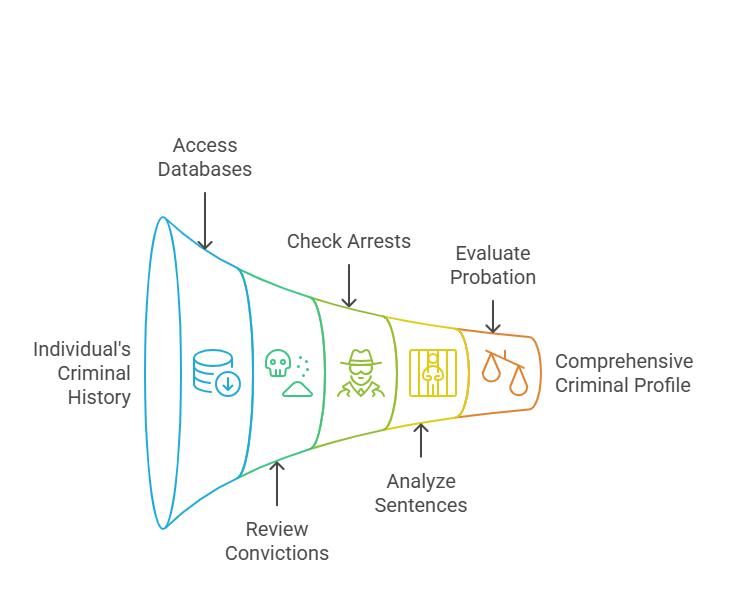
In Michigan, a criminal background check refers to the process of reviewing an individual’s criminal history by accessing data stored in state and federal databases. This information may include details on criminal charges, convictions, arrests, and other legal proceedings, such as probation or parole. It may also show pending charges or warrants.
These background checks typically include:
- Felony and misdemeanor convictions: Records of any serious crimes or less severe offenses.
- Arrests and detentions: Information regarding any previous arrests, regardless of whether the individual was convicted.
- Sentences and incarceration records: Details about the length of imprisonment or alternative sentences.
- Probation and parole history: Information regarding the terms of an individual’s release or supervision.
Background checks in Michigan are vital tools for employers, landlords, and other entities to assess the criminal history of an individual they may hire, rent to, or interact with in a legal capacity.
Who Can Request a Criminal Background Check in Michigan?
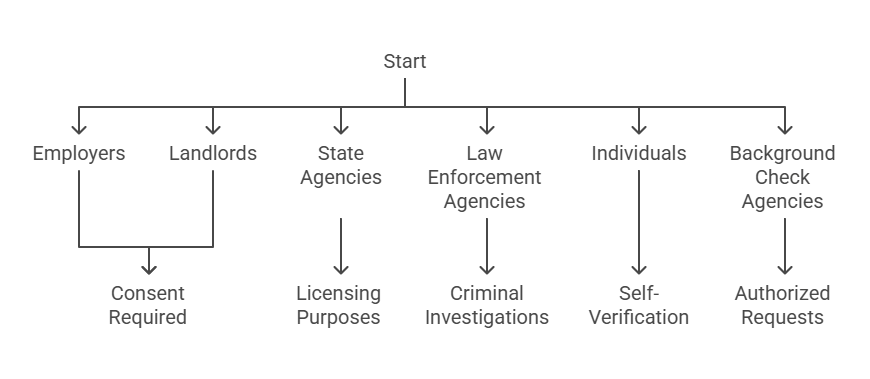
In Michigan, various entities are legally allowed to request a criminal background check, depending on the purpose and context. These entities include:
- Employers: Employers are often required to conduct background checks for prospective employees, especially for jobs involving sensitive information, children, or vulnerable populations. Employers in Michigan can request background checks with the consent of the applicant and must comply with the Fair Credit Reporting Act (FCRA).
- Landlords and Property Managers: Landlords may request criminal background checks on potential tenants to assess the safety and reliability of individuals renting their properties. The information is used to determine if a tenant poses a risk to other tenants or the property itself.
- State Agencies: Government agencies in Michigan, such as the Department of Health and Human Services (DHHS) or the Department of Licensing and Regulatory Affairs (LARA), may request criminal background checks for licensing purposes or public safety reasons.
- Law Enforcement Agencies: Law enforcement bodies may conduct background checks for purposes related to criminal investigations, safety clearances, or other law enforcement activities.
- Individuals: In Michigan, individuals can request a copy of their own criminal background check. This can be done to verify their own records, dispute any inaccuracies, or prepare for applications (e.g., for a job or rental agreement).
- Background Check Agencies: Third-party agencies, such as private companies or background check services, can request and provide criminal history information on behalf of employers, landlords, or individuals with proper authorization.
Legal Requirements for Criminal Background Checks in Michigan
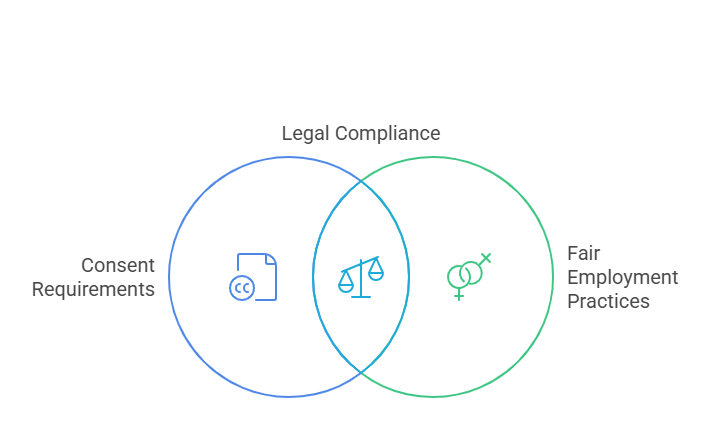
Michigan law governs the use of criminal background checks to protect both individuals’ privacy and public safety. Here are some key legal aspects to consider when conducting a criminal background check in Michigan:
- Consent is Required: Michigan law requires that the person being checked must consent to the background check in most cases, particularly when the check is for employment or rental purposes. This consent must be obtained in writing.
- Expungement Laws: In Michigan, certain criminal convictions may be eligible for expungement, meaning that a person’s criminal record could be sealed or erased after a certain period of time. This can affect what shows up on a background check.
- Fair Credit Reporting Act (FCRA): For employers or third parties conducting background checks, the FCRA applies. It requires that the information be obtained legally, and individuals must be informed if any negative decisions, such as a job rejection, are made based on the results.
- Ban the Box Laws: Michigan has “Ban the Box” laws that prohibit employers from asking about an applicant’s criminal history on the initial job application. This ensures that applicants are not automatically disqualified based on criminal history before an employer has the opportunity to evaluate their qualifications.
- Use of Criminal Records in Hiring and Housing: While employers and landlords can consider criminal history, they are generally required to evaluate the severity and relevance of the offense. In certain cases, using a criminal record as the sole reason to deny employment or housing could be considered discriminatory, especially if the crime was committed long ago or if the person has shown evidence of rehabilitation.
- State and Federal Databases: Criminal background checks in Michigan may pull information from both state and federal databases. State databases include the Michigan State Police (MSP) Criminal Justice Information Center, while federal checks can access FBI records.
Michigan’s laws ensure that criminal background checks are conducted in a fair and ethical manner, balancing the need for safety with the protection of individual rights. Understanding who can request these checks and the legal framework surrounding them is key to ensuring compliance with state and federal regulations.
How to Get a Criminal Background Check in Michigan: Step-by-Step Process
Obtaining a criminal background check in Michigan involves several steps, which can vary depending on the requesting party and the purpose of the check. Whether you’re an employer conducting a background check for a potential hire or an individual checking your own criminal history, the process is relatively straightforward but requires attention to detail. This section will guide you through the steps required to obtain a criminal background check in Michigan, including the agencies involved, the necessary documents, and the expected time frame for results.
Step-by-Step Process for Obtaining a Criminal Background Check in Michigan
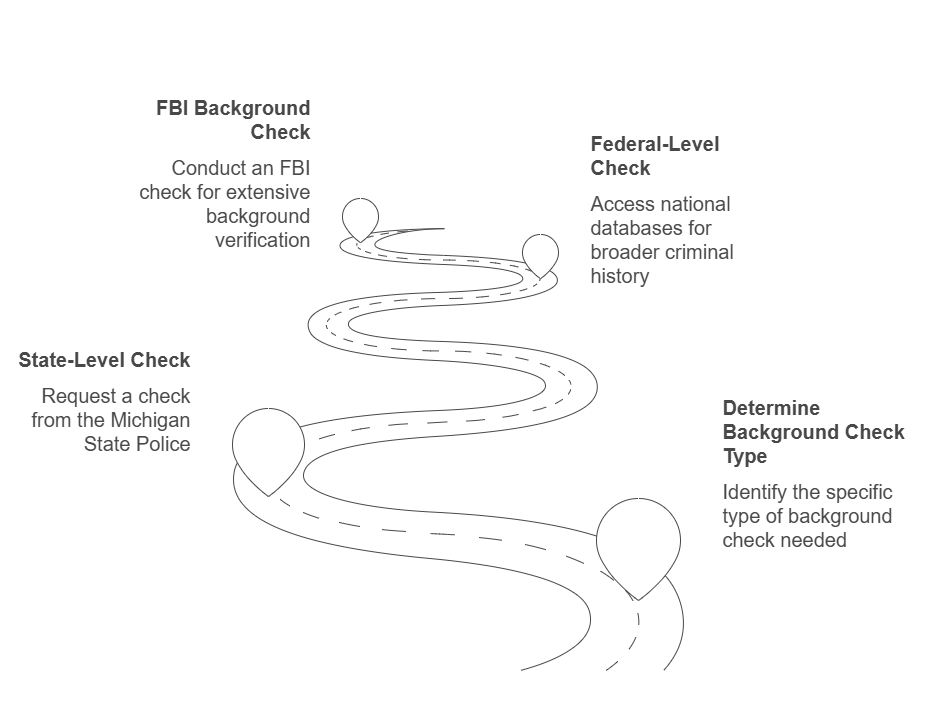
- Determine the Type of Background Check You Need
Before beginning the process, it’s important to determine the type of criminal background check you need. There are different levels of checks that can be requested depending on the circumstances:
- State-Level Check: This is the most common type of check for individuals or employers who need to verify a person’s criminal history within Michigan. It provides information from the Michigan State Police (MSP) database.
- Federal-Level Check: This check accesses national databases and provides a broader view of criminal history, including offenses that occurred outside of Michigan.
- FBI Background Check: For more extensive background checks, particularly for high-security positions or government-related jobs, an FBI background check may be required.
- Submit a Request to the Michigan State Police (MSP)
For most individuals and employers in Michigan, the state-level criminal background check can be obtained through the Michigan State Police (MSP). The MSP is responsible for maintaining criminal history records and provides background checks for both private individuals and businesses.
Precisehire:
In Michigan, conducting a criminal background check is an essential step for landlords to ensure the safety and security of their rental properties. Precisehire provides comprehensive criminal background check services that include detailed records from state and county databases, as well as national criminal registries. Our reports help you identify any potential risks associated with a prospective tenant’s criminal history, such as violent offenses or drug-related crimes. By using Precisehire, Michigan landlords can make informed decisions while staying compliant with state laws and ensuring that their properties remain safe and secure for all tenants.
How to Request a Criminal Background Check through MSP:
- Online Request: The MSP offers an online service called the IChat system, where you can request a criminal background check. This service is available 24/7 and is fast, easy, and secure. You will need to create an account and pay the necessary fees.
- In-Person Request: Individuals can also visit a local MSP office or the Criminal Justice Information Center (CJIC) to request a background check. You will need to provide valid identification and may need to fill out a request form.
- Mail Request: For those who prefer not to use the online or in-person options, a mail request can be submitted. This option requires completing the appropriate forms and mailing them to the MSP along with the payment.
- Provide Required Information
When requesting a criminal background check, the requesting party (whether it be an individual or employer) will need to provide specific information about the individual being checked. This typically includes:
- Full name
- Date of birth
- Social Security number (optional, but helps to ensure accuracy)
- Address
- Additional identifiers, such as a driver’s license number or fingerprint card (for more detailed checks)
For employers or government agencies, additional documentation may be required, such as proof of employment or official forms.
- Payment of Fees
There are fees associated with obtaining a criminal background check in Michigan, and the costs can vary depending on the type of check and method of request. For example:
- State Background Check via IChat: The fee for a state-level background check through IChat is typically around $10-$12.
- Fingerprint-Based Check: If you’re required to undergo a fingerprint-based check (such as for certain employment or licensing purposes), the cost may be higher, ranging from $30 to $70.
- Federal or FBI Background Checks: These checks tend to have a higher fee, depending on the depth of the search and the agency conducting it.
Make sure to check the specific payment requirements for your chosen method of requesting the check.
- Wait for Results
Once the request is submitted, the time it takes to receive the results can vary depending on the type of check requested and the method of submission.
- Online Requests via IChat: These tend to provide results almost immediately, often within a few minutes. The information will be available to view and download directly from the IChat portal.
- In-Person or Mail Requests: If you request a background check in person or by mail, the processing time may take anywhere from a few days to several weeks, depending on the volume of requests and the complexity of the search.
For employers conducting background checks through third-party agencies, the results typically take longer due to the added steps involved in verifying and processing the data.
- Review the Results
Once the results of the criminal background check are available, it’s important to carefully review the information. Criminal history reports should include:
- Detailed offense history: Any criminal charges, convictions, or arrests on file.
- Disposition of cases: Information about the outcome of each case (e.g., conviction, dismissal, or acquittal).
- Sentencing information: Details about any sentences served, including probation or incarceration.
If there are discrepancies or if any information is inaccurate, individuals or employers may need to follow up with the Michigan State Police or relevant agencies to resolve the issue.
- Handling Discrepancies or Errors
If errors or outdated information appear in the criminal background check, individuals have the right to dispute or correct the information. Here’s what can be done:
- Request a Correction: If the report contains inaccurate details, such as the wrong conviction or arrest date, contact the Michigan State Police or the agency that issued the report to request a correction.
- Expungement: In Michigan, some criminal offenses can be expunged or sealed from an individual’s record. If eligible, individuals may request to have their records cleared through the legal expungement process.
- Use of Results for Employment or Other Purposes
Employers, landlords, and other requesters can use the criminal background check results for their intended purpose, such as hiring decisions or renting property. However, they must comply with Michigan’s Fair Employment Practices and applicable housing laws, ensuring that they do not discriminate against individuals based on their criminal history if the offense is not directly relevant to the job or housing opportunity.
FAQs and Key Considerations for Criminal Background Checks in Michigan
Criminal background checks in Michigan are an essential tool for ensuring safety and protecting businesses, landlords, and communities. As these checks become more common, many individuals and businesses have questions about their implications and processes. Below, we answer some of the most frequently asked questions regarding criminal background checks in Michigan, providing valuable insights for both individuals and businesses.
What Types of Criminal Records Are Included in a Michigan Background Check?
A criminal background check in Michigan typically includes several types of criminal records, depending on the requester's needs and the specific type of background check requested. Common types of records included in a Michigan criminal background check are:
- Felony Records: Includes serious offenses such as murder, assault, theft, drug trafficking, and sexual assault.
- Misdemeanor Records: Includes less severe crimes, such as petty theft, disorderly conduct, and simple assault.
- Arrest Records: Information about arrests, regardless of whether the person was convicted.
- Conviction Records: Information about offenses that resulted in a conviction, including both felonies and misdemeanors.
- Sex Offender Registry: If applicable, individuals may appear in the Michigan Sex Offender Registry.
- Warrants: Information regarding outstanding arrest warrants.
It’s important to note that juvenile records are often excluded from background checks unless they are related to certain serious offenses. Similarly, expunged records (criminal records that have been legally sealed or erased) are not included in a background check.
How Do Criminal Background Checks Impact Employment, Housing, and Legal Matters in Michigan?
Criminal background checks can significantly impact various aspects of life in Michigan, including employment, housing, and legal matters. Here’s how they may affect different areas:
Employment:
- Job Opportunities: Many employers in Michigan require criminal background checks as part of their hiring process. Certain offenses, such as violent crimes or theft, may disqualify an applicant for specific roles, especially those in positions of trust or in industries requiring high levels of security.
- Ban-the-Box Laws: Michigan has adopted the "ban the box" law for public sector employment. This law prohibits employers from asking about criminal history on the initial job application. However, criminal records may still be considered later in the hiring process.
Housing:
- Rental Applications: Landlords may conduct criminal background checks to determine an applicant’s suitability for renting. A criminal record may result in the denial of a rental application, particularly for violent offenses or offenses related to property damage.
- Fair Housing Laws: It's important for landlords to comply with federal Fair Housing Act guidelines, which prohibit discrimination based on race, color, national origin, religion, sex, familial status, or disability. Criminal history should be evaluated carefully to avoid potential legal issues.
Legal Matters:
- Court Cases: Criminal background checks play a crucial role in legal cases. For instance, if someone is involved in a lawsuit or legal dispute, having a criminal record may influence the outcome, particularly in cases involving trust, custody, or fitness.
- Probation/Parole: A criminal background check is typically required when an individual is seeking to be released on parole or when they are applying for a reduction in sentencing.
How Can Someone Dispute or Correct a Michigan Criminal Background Check?
If you believe the information in your Michigan criminal background check is incorrect or outdated, it’s important to dispute or correct the errors promptly. Here’s how to go about it:
- Obtain a Copy of Your Criminal Record: First, request a copy of your Michigan criminal record from the Michigan State Police or the relevant agency.
- Identify the Errors: Carefully review the record for any inaccuracies, such as incorrect charges, dates, or personal details.
- File a Dispute: If you find discrepancies, file a dispute with the Michigan State Police or the agency that provided the background check. You may need to provide documentation to support your claim, such as court records or proof of expungement.
- Expungement: If your criminal record includes offenses that are eligible for expungement under Michigan law, you may apply to have them removed from your record. Expungement can significantly improve your opportunities for employment and housing.
Key Considerations for Individuals and Businesses Using Criminal Background Checks
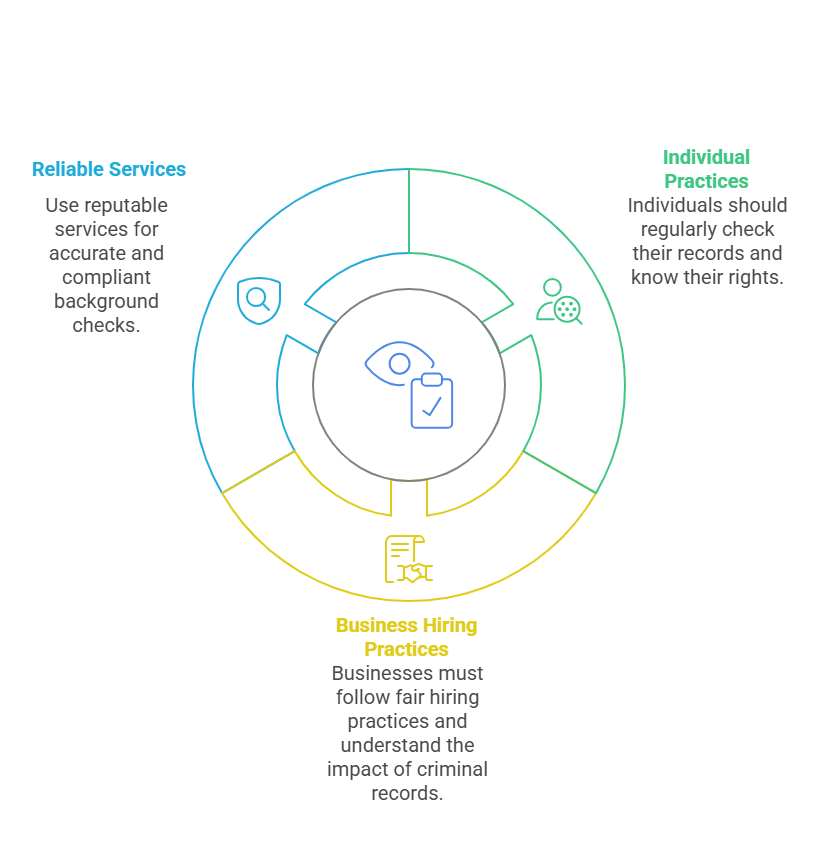
For individuals and businesses involved in criminal background checks, it’s important to consider the following key factors:
For Individuals:
- Regularly Check Your Own Record: Individuals should regularly check their own criminal record to ensure its accuracy, especially before applying for jobs or housing.
- Know Your Rights: Be aware of your rights under Michigan’s expungement laws, as well as protections under the Fair Credit Reporting Act (FCRA) and Ban-the-Box laws for employment.
- Request a Copy: If you are applying for a job or renting a home, it’s wise to request a copy of your criminal background check to understand what employers or landlords will see.
For Businesses:
- Follow Fair Hiring Practices: Ensure that your hiring practices comply with state and federal laws regarding criminal background checks, such as Ban-the-Box laws and EEOC guidelines on the use of criminal history in employment decisions.
- Understand the Impact of Criminal Records: Businesses should weigh the nature of the offense, the time passed, and the role for which the individual is applying when considering criminal history in employment decisions.
- Use Reliable Background Check Services: Choose trusted, reputable background check services that provide accurate, up-to-date information, ensuring compliance with Michigan’s legal requirements.
Conclusion
Criminal background checks in Michigan play an essential role in safeguarding businesses, individuals, and communities. They provide valuable insight into an individual’s criminal history, which can influence hiring, housing, and legal decisions. By understanding the types of records included, their impact on employment and housing, and how to dispute inaccuracies, both individuals and businesses can navigate the process more effectively. Individuals can proactively address potential issues with their criminal records, while businesses can ensure that they are conducting background checks legally and fairly.
